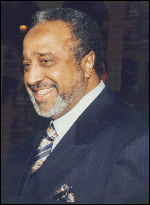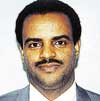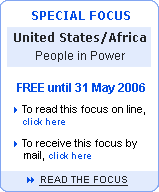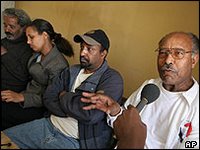New round of negotiations to break the deadlockIndian Ocean Newsletter N° 1178 22/04/2006Whereas the American Administration is doing its best to negotiate the fre

ei
ng of the imprisoned Ethiopian opposition leaders, the Prime Minister Meles Zenawi is digging in his heels. He runs the risk that a growing number of opponents accept the idea of armed struggle against his regime as inevitable. In an attempt to limit this slide, already underway among the Diaspora, Ethiopian diplomacy is to wage an aggressive propaganda campaign to sideline the opponents in exile who support the most radical positions.
Aggressive diplomacy. A memorandum dated February 2006 from the ministry for foreign affairs in Addis Ababa sent to its embassies abroad illustrates this strategy. This fifty page document includes a series of instructions for the implementation of what it calls “an aggressive multi-faceted campaign” of public relations abroad, using various means (such as public meetings, forums, seminars and the use of sympathetic radio stations). It also called for the identification of the most hard-line opponents so that powerful targeted propaganda campaigns can be initiated against them in order to discredit them by all possible methods. The infiltration of “anti-peace” forces was also recommended. The minority ethnic groups should be approached by someone from the same ethnic group so they can be kept distinct and separated from “chauvinists”, a term generally attributed to Amhara nationalists. According to the same document, the Hodams (greedy) should be attracted by the government promises for trading licences, houses and opportunities to invest in Ethiopia.
Negotiations. Meanwhile, back in Addis Ababa, American diplomats are continuing their efforts to obtain the freeing of the leaders of the Coalition for Unity and De

mocracy Party (CUDP), under certain conditions. Vicki Huddleston, the American chargée d’affaire, made an urgent call this week to Professor Donald Levine (pictured left), the previous negotiator who had been used at the beginning of the year, to meet Meles Zenawi. But Levine had other “important engagements” and could not make the journey to Addis Ababa. Nonetheless, he wrote a letter to Meles Zenawi which he sent to Addis Ababa through an Ethiopian colleague, also sending a copy to Huddleston. Meles Zenawi was indeed handed this letter but he did not accept to meet the messenger who had brought it. After his previous visit to Ethiopia when he had met the Prime Minister and the imprisoned CUDP leaders, Levine had put a damper on criticisms of Meles Zenawi, whom he now considered to be a “sincere” leader, like the CUDP leaders. Levine and Huddleston have tried, so far in vain, to convince the imprisoned CUDP leaders to take up their seats in the Addis Ababa Parliament as a condition for their being freed from prison, hence enabling Meles Zenawi to save face.
Deadlock in Addis. Alongside these negotiations, at the end of March the Prime Minister had given the CUDP leaders, then still at large, three weeks to accept to take up their seats in the local council in Addis Ababa, to which they had been elected in May 2005. Ayele Chamiso and the EDP-Medhin led by Lidetu Ayalew agreed to this strategy and undertook to try to convince a majority of the opposition elected local councillors to make amends. But by 18 April they had not managed to gather the 70 signatures of local elected councillors they needed. Meles Zenawi gave them another ten days, after which the current Addis Ababa Administration would be renewed for one year. One final attempt to reconcile the parties: Huddleston and the French Ambassador Stéphane Gompertz, went to Kalilit prison on 18 April to discuss all this with the imprisoned CUDP leaders, hoping that they would at last accept the conditions set by Meles Zenawi for their liberation. According to some sources, Huddleston took advantage of the visit to warn the CUDP leaders against the temptation of certain of their representatives in exile of accepting Eritrea’s proposal to arm and train opposition groups. Even if the proclamations of military victory by certain Ethiopian opposition groups, relayed by Eritrea, are an exaggeration, a majority of opposition groups in the Ethiopian Diaspora are now coming to agree on the need to wage coordinated armed actions against the EPRDF , both in towns and in rural zones.
Al Amoudi’s plans for OromiaIndian Ocean Newsletter N° 1178 22/04/2006The leading investor in the country, Mohamed Hussein Al Amoudi, has plans for projects worth almost 100 million euros in Oromia Regional State.
The Saudi-Ethiopian magnate Mohamed Hussein Al Amoudi is planning new

investments in Oromia Regional State worth almost 100 million euros. To begin with, the construction of a five star hotel in the tourist region of Boku, near Debre Zeit, which has already been the subject of a feasibility study. Al Amoudi is also planning to install, also in the Oromia Regional State, a food processing factory and a unit for working semi-precious stones.
In addition to these projects, he has just signed a memorandum of understanding with the President of Oromia Regional State, Abadula Gemeda, for the construction of a cement works in North Shoa. Al Amoudi has hired the Deputy Minister of Infrastructure, Haile Assegidie, to run this new factory, which is expected to be operational within two years. Up to now, Assegidie had been a consultant for the firm Midroc Ethiopia which is owned by Al Amoudi. Furthermore, Al Amoudi has put one of his Ethiopian assistants, Nebyou Samuel, in charge of supervising all of these new investment projects in the Oromia Regional State.
Nebyou Samuel has lived in Los Angeles (USA), where he was a partner with Meshesha Biru in an automobile insurance company. He was then married to Akuye Tesfa with whom he has had one child, before divorcing and remarrying a friend of Al Amoudi’s. Nebyou and Meshesha between them created the Ethiopian Democratic League (known by its acronym in the Amharic language of Idiq) and returned to Ethiopia to support the governing coalition EPRDF at the beginning of the 1990s. At the time, Nebyou was seen poorly by the Ethiopian nationalists because he went to Asmara to apologise for the crimes Ethiopia had committed against Eritrea. The Idiq group subsequently disappeared and Meshesha returned to Los Angeles to resume his insurance business while nevertheless continuing to work with the Ethiopian Consul there. Nebyou, for his part, stayed in Ethiopia where he worked briefly for the Inter Africa Group owned by Abdul Mohamed Ababora, before being taken on by Al Amoudi.
Former Minister of Revenu now Director General of the Endowment Fund For the Rehabilitation of Tigray (Effort)Indian Ocean Newsletter N° 1178 22/04/2006The former Minister of Revenu has been made Director General of the Endowment Fund For the Rehabilitation of Tigray (Effort), a consortium of companies created by

the part
ies in the Ethiopian governing coalition. Getachew Belay Wendimu replaces Abadi Zemu in this post. Zemu is currently the Vice President of the Tigray Regional State. Getachew Belay was a minister for five years until he was resoundingly defeated by the opposition member Hailu Shawel in the May 2005 parliamentary elections. He was subsequently dropped from the government formed at the end of 2005 by Prime Minister Meles Zenawi. Getachew Belay is an Amhara, a graduate in economics and has been chairman of the board of the Ethiopian Telecommunications Corporation (ETC).
 ...“We’re not against this government,” Fassil Yenealem, the jailed publisher of Addis Zena, told CPJ. “It is through this government that we began to write. But when the government sees people starting to demand more democracy, freedom of expression, and development, they think it’s the fault of the press.”
...“We’re not against this government,” Fassil Yenealem, the jailed publisher of Addis Zena, told CPJ. “It is through this government that we began to write. But when the government sees people starting to demand more democracy, freedom of expression, and development, they think it’s the fault of the press.”















